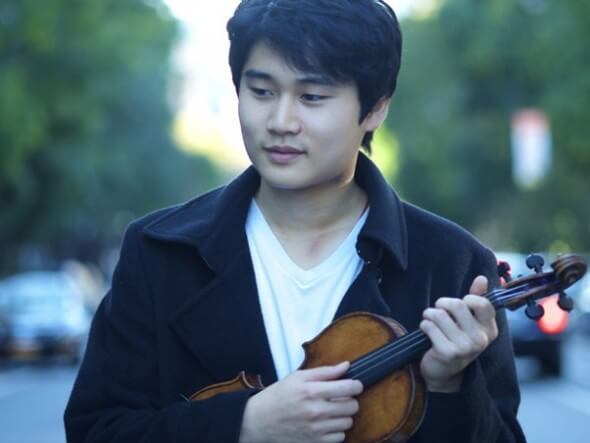In Mo Yang Receives Rave Boston Globe Review

This story was originally published in the Boston Globe by Jeremy Eichler:
September 29, 2015
In addition to offering classical-era symphonic gems in the intimacy of Faneuil Hall, the Boston Classical Orchestra routinely provides rare opportunities to hear Boston-based musicians stepping up as soloists. Often these guest artists are well-known chamber musicians or members of the Boston Symphony, but last year BCO held its first Young Artists Competition and awarded the top prize to violinist In Mo Yang, a student at New England Conservatory.
Yang, 19, grew up in South Korea and studies with Miriam Fried, whom he has credited as fundamentally changing his way of playing. They clearly are working well together. Since winning its competition and performing with the BCO last year, Yang has claimed a major international victory, picking up first prize at the prestigious Paganini Competition in Genoa, Italy. He is now approaching the threshold of a soloist’s career, with debuts lined up at the Concertgebouw in Amsterdam and the Danish National Orchestra, among others.
On Sunday afternoon, Yang was back with BCO at Faneuil Hall to perform the Beethoven Violin Concerto as part of the orchestra’s season-opening program, an all-Beethoven affair under the baton of music director Steven Lipsitt. In his Beethoven, the qualities that have earned Yang early notice were immediately apparent: a seamless technique and a tender warmth of tone, both of which made his navigation of the famous first-movement cadenza by Fritz Kreisler a particular pleasure. But Yang also possesses an ability to project an engaging sense of inner sincerity through his playing — a distinguishing quality among aspiring soloists for whom virtuosity is a given.
At Sunday’s performance, which was said to be Yang’s first public traversal of this iconic concerto, the serene beauty, evenness, and poise of his playing took center stage, and proved absorbing on its own terms. Of course, a soloist’s relationship to a touchstone score like this one ideally continues to deepen over the length of his career. One can picture Yang’s interpretation growing stronger as he works in the coming years to further sharpen the sense of narrative thrust in his playing and refine the precision of his imagination for color. Clearly, he is already well on his way.
Lipsitt and the orchestra opened the program with a lively rendition of a brief and rarely spotted work, the “Congratulations” Minuet. Beethoven wrote this high-spirited piece to honor a new director of the Theater an der Wien. (In a program note, the music’s warm wishes were redirected toward the evening’s young soloist, on the occasion of his recent victory in Genoa.) After intermission came Beethoven’s Fourth Symphony, delivered here in a fresh reading that conveyed the music’s primal energies — that signature Beethovian ebullience and vigor which, when summoned at Faneuil Hall, has a way of vibrating up through the floorboards.
See In Mo Yang live at Purdue University on November 13!